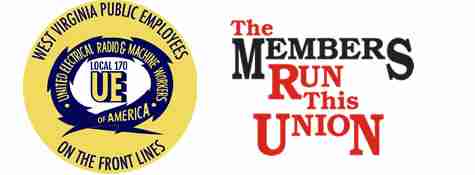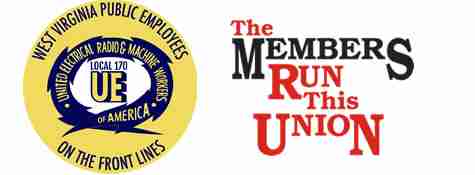CHARLESTON, W.Va. — State employees rallied at the Capitol on Monday for higher wages, better worker safety and protection of benefits. The rally was made up of about 30 member of the United Electrical Workers Local 170, based in Charleston. At its seventh annual Presidents Day rally, UE Local 170 displayed posters stating: “End Favoritism, Honor Senoirty,” “Raise Our Pay, Not Our Workloeads” and “Low Wages Hurt West Virginia.”
Andrew Dinkelaker, secretary-treasurer of the UE, said, “We represent over 1,000 members around the state. We want you to grow that number.”
Deb Gornall, president of UE’s Eastern Region, said Local 170 recently helped win a victory before Kanawha County Circuit Judge Duke Bloom, who awarded $500,000 in annual wage increases to workers at the state’s two psychiatric hospitals — Mitchell Bateman Hospital in Huntington and William R. Sharpe Jr. Hospital in Weston. Each annual raise was $2,000 a year.
“Even as Governor [Earl Ray] Tomblin continues to balance the [state] budget on the backs of state workers, we need to fight for the interests of those workers. We have to organize,” Gornall said. “We’re here to tell the Legislature that enough is enough.”
Sherry Wilkins, who works for the state Department of Environmental Protection, said, “We are nowhere near equity and fairness in the grievance process.
“I have experienced harassment and retaliation for standing up for workforce rights when people file a grievance,” Wilkins said. “Agencies are not held accountable for retaliation. There are no penalties for violations of the due process of employee rights.”
Wilkins said three new pieces of legislation will be introduced to reform existing grievance procedures for state workers.
Jim Hawkins, who works at Sharpe, said, “State hospitals workers need more help. At Sharpe Hospital, there are more staff injuries than in the entire state Department of Corrections.
“I just came off of a two-month leave for broken ribs from an injury caused by a patient.”
Hawkins also pointed to a co-worker who had his arm bitten by a patient.
“The training we receive is completely inadequate, which results in injuries. Many times, there is only one person there when something goes crazy,” Hawkins said.
Crisis Prevention Intervention training, a nonviolent physical way of controlling violent patients, is completely inadequate at Sharpe, he said. “Most of us love our jobs. Some people don’t have the opportunity to get any other job.”
Hawkins also said Sharpe Hospital is very overcrowded. “The overflow rooms have no windows. And there are no bathrooms or showers in those rooms.”
While many state and federal agencies do not negotiate contracts directly with unions, union membership is rising fastest in the public sector. Union membership, in general, has been dropping throughout the U.S.
In 2012, the national union membership rate was 11.3 percent, dropping from 11.8 percent in 2011, according to the U.S. Bureau of Labor Statistics. In West Virginia, the percentage of overall union membership dropped from 13.8 percent in 2011 to 12.2 percent in 2012. In 1983, when the BLS first began compiling these statistics, 20.1 percent of all workers nationally were union members.
But in 2012, 35.9 percent of all public-sector workers belonged to unions — a rate more than five times higher than private-sector workers. Only 6.6 percent of the country’s private-sector workers belonged to unions last year.
Reach Paul J. Nyden at pjny…@wvgazette.com or 304-348-5614.

